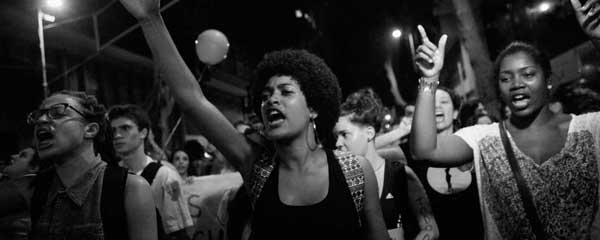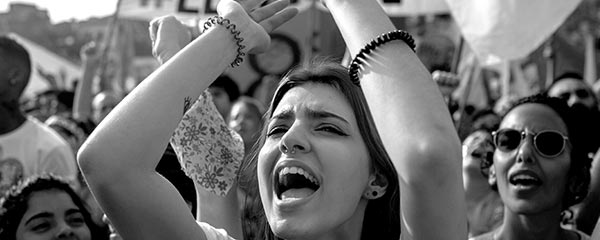
A conversation with Johanna Godoy
Gallup's Regional Director for the World Poll in Latin America and the Caribbean
In a number of countries in Latin America, there were, or still are, movements similar to the #MeToo movement in the U.S. -- such as #NiUnaMenos, which started in Argentina.
Do you think they have changed anything for women in your region? Do people still talk about it?
Godoy: A simple response is "yes." Today, more than ever, these movements have important visibility in many countries in the region. #NiUnaMenos has had a significant impact not only in Argentina, but also in many other countries. There are examples of multiple movements coming together as one for the same purpose of equality and protecting women. In Ecuador, for example, you can see the hashtag #NiUnaMenos together with #VivasNosQueremos.
Other movements, like #EnoughofHarassment in Brazil, have helped women to raise their voices and report some type of abuse. This movement started in the television industry. Now through social media, it encourages women to feel more comfortable sharing their stories.
Some countries have made important progress in terms of documenting and preparing the field to implement public policies that protect women from violence. An example is Argentina. Just last year, the country created a unique record of cases of violence against women, compiling information from 2013 to 2017. This helped facilitate the discussion about this problem.
But for people to perceive a significant impact, work still needs to be done in terms of laws, legal protection, awareness and education.
Violence -- or insecurity -- and inequality are two serious problems for women in Latin America. Do you see any progress on this front? In some countries more than others?
Godoy: I feel there is more awareness about the environment for women in the region, but it is still imperative for governments to implement strict public policies related to women's security. Inequality and violence are still big problems. For example, Brazil ranks 95th in the world on the Global Gender Gap Index.
In Ecuador, after numerous femicide cases, the country passed laws to end violence toward women. More education and planning are still needed, though, to fully implement these types of laws and to see any impact.
But these efforts are not enough. The Latin America region still reports the highest percentage of insecurity and violence in the total population. On average, 61% of adults in Latin America in 2017 said they do not feel safe walking alone at night in the areas where they live, and it is much higher among women (67%) than men (54%).
Respect for women is also an issue. The region typically has the lowest scores on Gallup's question of whether women in their countries are treated with respect and dignity. Has this changed?
What do you think it will take for that mindset to change?
Godoy: Sadly, the Latin America region continues to be the least likely in the world to perceive women as being treated with respect and dignity.
The numbers don't show important improvements: While 65% worldwide perceive women as being treated with respect, only 35% in Latin America perceive women as respected.
In our 2018 World Poll measurement, among the countries with the lowest perceptions of women being treated with respect are Peru (19%), Brazil (23%), Haiti (23%), Colombia (24%) and Argentina (29%).
These numbers have not changed much over time. In some countries the situation has worsened; such is the case of Ecuador, which had a significant drop of 11 percentage points from 2017 to 2018. The key question here is if the situation is worse or if the population is more sensitive to this problem because of the relatively recent campaigns and the proliferation of movements fighting for women's rights.
There have been important initiatives, movements and support from international and local organizations focusing on the same goal that I feel, with time, will make a difference. Social media has been an important element to disseminate the message, but obviously it does not reach all levels and every corner of the region. More education, more awareness and action will make the difference.
Tell me about some of the positive changes you are seeing for women in Latin America. Tell me what gives you hope.
Godoy: I have hope for change and know it will take time, but I believe the first steps have been taken. There are communities and movements that have been getting together and raising their voices.
It is a worldwide movement and Latin America is in it. But we need to take into account that these efforts are not getting to every woman in every corner of their countries. The big challenge is to continue creating networks that touch the most remote corner and to bring the support they need, to create real solid structure together with public policies, assigned budget, resources, counseling, etc. Seeing all these groups and movements being vocal and fighting for their rights and those of future generations gives me hope.
Do you have any stories or examples from your work in these countries that you can share that illustrate how things are getting better for women?
Godoy: I have visited urban and rural areas of Latin America for more than 15 years, and I can feel, and have already seen, change in some areas. For example, there are more entrepreneurial women today than in the past. It is so common to find women making tortillas, arepas, almojábanas and pupusas in their homes, looking for economic independence. Years ago, this was not easy to see -- men were mainly the providers; nowadays, this is very different.
Another example is the frequency that we find for boys helping moms with household chores. Now you don't see the big gap between girls and boys that we used to see 10 years ago.
I can feel much more empowerment in the voices of Latin American women nowadays, but it is just the beginning. Many more changes need to be made to create a safer, more equitable environment for girls and women in the region.
Read more stories about women around the world on our International Women's Day page.

